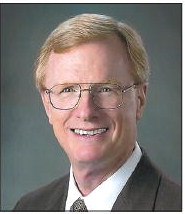JQC Director Denies Reeves’s Motion


mrandolphadvance@gmail.com
Judicial Qualifications Commission ( JQC) Director Courtney Veal has denied a motion by Middle Judicial Circuit Chief Superior Court Judge Robert Reeves to dismiss almost all of the 58 charges which the JQC brought against the judge on November 16, 2022.
According to the Supreme Court of Georgia records, Reeves filed the motion to dismiss, or in the alternative, a motion for judgment on pleading on May 15, citing that the Constitutional principles used as a basis for the charges are inap- continued from page
plicable to the situations referenced. In this document, Reeves argued that the Commission stated that the presence of “habitual intemperance” and “conduct prejudicial to the administration of justice” within the judge’s actions, which were reported through formal complaints, are irrelevant to the current investigation and should therefore not be used to determine whether further corrective action is necessary.
Veal filed her response to the situation on June 12, which stated that “because the allegations contained in the Formal Charges, when taken as true, constitute violations of the Code of Judicial Conduct and warrant discipline pursuant to Georgia Constitution Article VI, Subsection VII, Paragraph VII (a), [Reeves’s] Motion should be denied.” She went on to further discuss Reeves’s reasons that the charges should be dismissed, citing the relevant laws to each matter.
According to both parties, the Georgia Constitution provides the Commission with “the power to discipline, remove, and cause involuntary retirement of judges” on the basis of “willful misconduct in office, willful and persistent failure to perform the duties of office, habitual intemperance, conviction of crimes involving moral turpitude, or for conduct prejudicial to the administration of justice which brings the judicial office into disrepute.”
In his document, Reeves stated that the Commission does not define what “habitual intemperance” is through any of their official documents, but the Georgia Code of Law associates the term “intemperance” with drunkenness throughout various occupations other than law. He explained that under this basis, the Commission had confused the term “intemperance” with “intemperate,” and further stated, “Throughout the Georgia Code where intemperance justifies professional discipline in other occupations, the Legislature and state agency regulators have consistently declared its clear meaning to constitute repeated public intoxication.”
He further emphasized that this clear meaning did not apply to spoken words, which is what the evidence supplied by the Formal Complaints received by the Commission had been associated with and therefore, are inapplicable to the charges. Because of this inapplicability, Reeves stated that the authority to discipline him based on “habitual intemperance” should be dismissed as a matter of law.
Veal responded to this statement, as she explained, “Contrary to [Reeves’s] assertion that the JQC’s Investigative Panel is confused about the meaning of ‘habitual intemperance,’ the term is discussed within Georgia’s judicial disciplinary precedent and clearly defines judicial conduct such as ‘yelling, vulgar language, or improper physical contact. As such, [Reeves’s] violations constitute habitual intemperance as defined within Georgia’s judicial disciplinary precedent (and not obscure, inapplicable disciplinary precedent for contractors, plumbers, or doctors that overindulge in ‘alcoholic spirits, narcotics, or stimulants’) and present a Constitutionally organized ground for judicial discipline.”
Next, she addressed the motion to dismiss the formal charges regarding “willful misconduct in office.” Reeves argued that most of the counts – 43 of the 58 – which were filed with the proposed violation of “willful misconduct in office” could not be used to permit professional discipline by the Commission because of the referenced actions not taking place in a judicial capacity. As Reeves cited in the document, the conduct discussed in the formal charges took place in various settings, such as in private conversations aside from Reeves’s judicial duties within the courtroom and through online livestreams, separating them from the legal umbrella of the violation. He stated that the authorizing provision for these specific counts should be dismissed as a matter of law.
Yet, according to Veal, these incidents involved Reeves “acting outside his judicial capacity” and acting in ways which are “unjudicial and harmful to the public’s esteem of the judiciary,” constituting authorized ground for judicial discipline.
Overall, Veal explained that although Reeves felt that the charges brought by the JQC did not follow Georgia civil law guidelines, “a plain reading of the JQC Rules calls into question whether the sections of Georgia’s Civil Practice Act, which form the basis of [Reeves’s] Motion for pre-hearing relief are applicable or controlling in JQC proceedings.” She went on to note that in further sections of JQC Code, the law differentiated between this Act and JQC proceedings, making it null and void in the situation.
Now that Veal has denied this motion, dates will be set for hearings to continue the process of investigating the actions of Judge Reeves in these reported scenarios.




